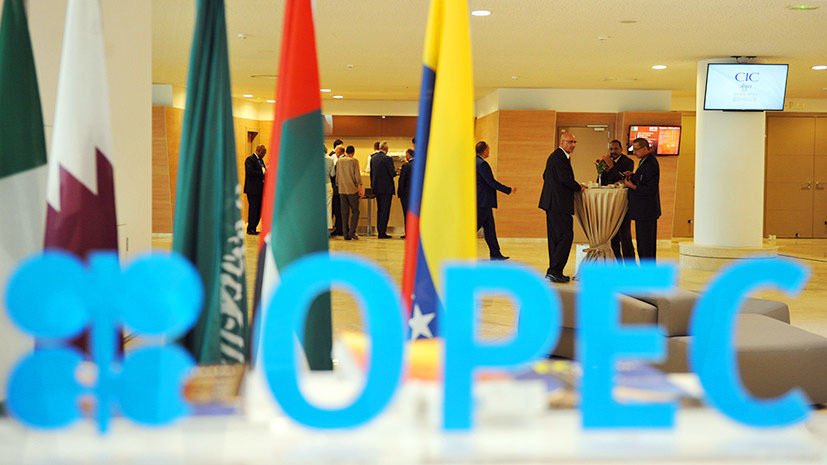On December 4, the price of Brent crude oil rose by 2% to $ 62 per barrel. This is evidenced by the ICE exchange in London. At the same time, on the eve of the quote fell to $ 60.3. Experts attribute the price fluctuations of recent days to the uncertainty of investors before the ministerial meeting of OPEC and the countries participating in the OPEC + deal.
From December 5 to 6, the ministers of oil exporting countries will hold their last meeting in 2019 in Vienna. As expected, the parties will discuss the fate of the agreement to reduce energy production.
Recall that from January 1, 2019, the parties to the OPEC + agreement reduce oil production by 1.2 million barrels per day from the level of October 2018. The main volumes of daily reduction are in Russia and Saudi Arabia - 228 thousand and 322 thousand barrels, respectively. The deal is valid until the end of March 2020 and should lead to a balancing of supply and demand in the global market.
“Most likely, based on the results of the Vienna meeting, the deal will be extended for at least six months. Now it’s profitable for all parties to the agreement to continue cooperation, because it is thanks to him that oil prices are still quite high, ”said Narek Avakyan, head of BCS Broker investment department, in an interview with RT.
OPEC + itself has already recognized the need to continue to reduce production after March 2020. This was previously stated by the Minister of Oil and Gas of Oman, Mohammed bin Hamad ar-Rumhi. In his opinion, the contract should be extended until the end of 2020. Moreover, the decision of the oil exporting countries will partly depend on the results of the US presidential election.
Controversial issue
Participants in the Vienna meeting will also consider the possibility of further increasing the volume of oil production cuts by 400 thousand barrels per day. This was previously reported by TASS with reference to Iraqi Oil Minister Tamer al-Gadban.
The issue of reducing the production of raw materials may become a cause for a dispute between countries - exporters of hydrocarbons, says Mikhail Kogan, head of the analytical research department of the Higher School of Financial Management
“The upcoming summit may turn out to be no less difficult than last year, when at some point the future of OPEC itself was at stake because of Iran’s unwillingness to make a symbolic reduction in production under the conditions of sanctions. Today, the intrigue is created by the contradictions between Russia and Saudi Arabia, ”Mikhail Kogan explained to RT.
According to Artyom Deev, head of the AMarkets analytical department, RT, the Saudi authorities are most actively in favor of reducing the volume of oil produced. Thus, a reduction in production should reduce the global supply of hydrocarbons and cause an increase in energy prices. According to Deyev, expensive oil is needed by Saudi Arabia to implement the budget and successfully enter the state energy company Saudi Aramco on the stock exchange.
“In anticipation of the Saudi Aramco stock offering, the kingdom is most interested in maintaining relatively high oil prices. To balance the state budget, Riyadh needs prices in the range of $ 80-85 per barrel. But alliance members are unlikely to agree to this scenario. Today’s level of oil prices is satisfactory for many, and in the event of an even greater decline in production, countries will begin to lose market shares, ”the analyst explained.
As the head of the Ministry of Energy of Russia, Alexander Novak, previously noted, the official position of Moscow regarding the change in oil production remains a "secret". Meanwhile, at the end of November, Russian oil companies at a meeting in the Ministry of Energy proposed to maintain the current volume of production cuts and postpone the extension of the OPEC + deal until March. This was told to reporters by the vice president of Lukoil Ravil Maganov, reports RIA Novosti.
According to Mikhail Kogan, in the cold season, it becomes more difficult for Russian oil companies to reduce energy production. Therefore, if the countries participating in OPEC + nevertheless decide to lower the level of oil production, Russia will be able to take on only a “symbolic volume” of reduction.
Cautious approach
According to analysts, the extension of the OPEC + transaction and the maintenance of current production levels will not lead to a sharp change in world oil prices. According to RT analyst at Freedom Finance IC Alain Sabitov, at present the global hydrocarbon market remains relatively balanced.
“If we talk about global oil supply, now we can note a slowdown in US production growth. This allows OPEC + countries not to increase the volume of reductions. Such a decision will help maintain the current balance in the oil market and is unlikely to greatly affect quotes. So, Brent crude oil will remain near $ 60 per barrel, ”Alain Sabitov said.
According to the analyst, if at the December meeting the parties nevertheless decide to reduce the volume of oil production, then the quotes could rise to $ 65-70 per barrel. However, the participants will probably postpone the corresponding decision until the next meeting, Artyom Deev believes.
“In December, countries will announce intentions to further reduce quotas, but will not make a final decision and postpone the issue to the next meeting. In its desire to raise prices, Saudi Arabia has recently been forced to behave as cautiously as possible and not put pressure on countries that are members of the alliance. I note that almost a year ago, Qatar already left OPEC +, and from next year Ecuador leaves the organization, ”the analyst concluded.

